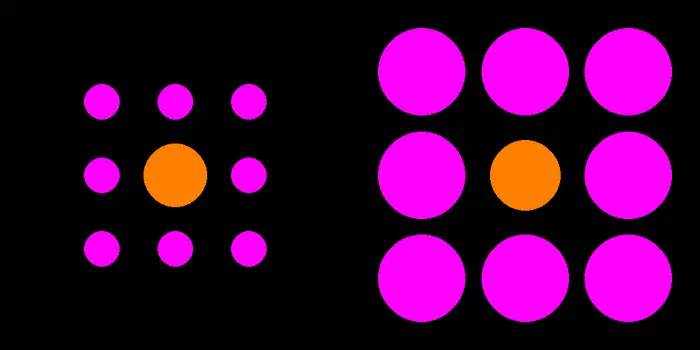Medical imaging professionals possess a unique set of skills that enables them to navigate complex visual information more effectively than the average person, particularly when confronted with optical illusions. Recent research reveals that this expertise not only aids in the accurate analysis of medical images but also extends to the ability to discern sizes and dimensions in seemingly deceptive visual stimuli. The study, conducted by an interdisciplinary team from various UK universities, sheds light on the cognitive advantages that come with specialized training in visual assessments.
At the core of this research is the Ebbinghaus illusion, a classic test of relative size perception. In this optical illusion, a central circle is surrounded by larger or smaller circles, significantly influencing the observer’s judgment about its size. A compelling finding from the study highlights that the orange circle on the left side may appear larger than its counterpart on the right, despite it actually being smaller by ten percent. This study marks a significant leap in understanding how visual perception can be aligned more closely with reality, especially for those who undergo extensive training in image interpretation.
The implications of mastering visual illusions are profound, particularly in fields where precise interpretation of visual data is quintessential, like medical imaging. The study unveiled that radiographers and radiologists displayed heightened accuracy in perceiving object sizes within these illusions compared to a control group comprised of non-experts. This suggests a direct correlation between the rigorous training associated with medical imaging and an enhanced ability to process and understand visual information, leading to more accurate judgments.
Dr. Martin Doherty from the University of East Anglia spearheaded this research, emphasizing that while optical illusions are often perceived as playful quirks of the human brain, they are instrumental in unveiling the inherent mechanisms that govern visual perception. The goal was to investigate whether individuals equipped with extensive visual recognition skills could navigate these illusions more successfully. This form of inquiry reveals not only the adaptive capacities of the brain but also the potential for training to effect meaningful change in perceptual abilities.
Participants in the study were shown a series of visual puzzles designed to challenge their judgment of size discrepancies. They were tasked with identifying which of two objects appeared larger, even when distortions were cleverly artfully applied to confuse the eye. The data indicated that the more trained individuals—those working within medical imaging—demonstrated significantly less susceptibility to visual misperception when compared to their non-expert counterparts. This was a pivotal revelation in a field where perceptual errors can lead to critical diagnostic mistakes.
Dr. Radoslaw Wincza, the study’s first author, noted that even the most well-known optical illusions can mislead individuals, despite being aware of their deceptive nature. Historically, it has been postulated that the abilities to train oneself to overcome such perceptual biases were limited; however, this research provides a contrasting perspective. The findings suggest that targeted training in accurately evaluating visual stimuli, like those found in medical imaging, may provide a measurable advantage in reducing one’s susceptibility to visual deceptions.
The study not only highlights the inherent capabilities of medical imaging professionals but also proposes a practical application for their skills. The ability to minimize errors related to visual perception could radically transform training protocols for emerging medical imaging specialists. This assertion is particularly crucial considering that a staggering 60 to 80 percent of diagnostic errors stem from perceptual inaccuracies—a sobering statistic that underscores the need for optimized training methods in recognizing visual anomalies.
This research project emerged from a collaboration of multiple institutions, including the University of East Anglia, Lancaster University, the University of Central Lancashire, and the University of Cumbria. The coalitions of these institutions reveal a strong commitment to advancing understanding in the field of visual perception and medical diagnostics. Moreover, the project received funding from a British Academy / Leverhulme Small Grant, emphasizing the importance of academic and financial investment in research areas that hold the potential for widespread clinical implications.
A central premise of the study, “Specific Visual Expertise Reduces Susceptibility to Visual Illusions,” is slated for publication in the peer-reviewed journal Scientific Reports. The article is scheduled for release on March 14, 2025, providing the academic community with valuable insights into the intersection of cognitive psychology and practical medical applications. As the study continues to garnet interest, it will likely provoke further examination of how specific expertise can foster cognitive adaptations that transcend professional boundaries.
This innovative research ultimately enriches our understanding of visual perception and its implications for medical practice. The ability to see through visual illusions has practical applications that reach far beyond entertainment and can profoundly influence fields that rely on precision and accuracy. As the medical community continues to grapple with the complexities of human perception, this research serves as a significant stepping stone for future inquiries into how specialized training can enhance visual accuracy among practitioners.
In conclusion, the convergence of visual expertise and optical illusion assessment is paving new avenues for improving diagnostic accuracy in medical imaging. As this area of research unfolds, it promises not only to reshape how professionals are trained but also to redefine our understanding of human perception and its inherent limitations. By further exploring these connections, we can eagerly anticipate innovative solutions that could greatly enhance the capabilities of medical image analysts in the years to come.
Subject of Research: People
Article Title: Specific Visual Expertise Reduces Susceptibility to Visual Illusions
News Publication Date: 14-Mar-2025
Web References:
References:
Image Credits: University of East Anglia
Keywords: Optical Illusions, Visual Perception, Medical Imaging, Cognitive Psychology, Diagnostic Errors, Training, Ebbinghaus Illusion, Visual Expertise, Research Study, Radiographers, Radiologists, Perceptual Accuracy.




